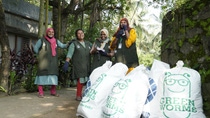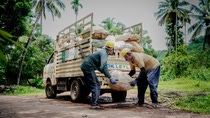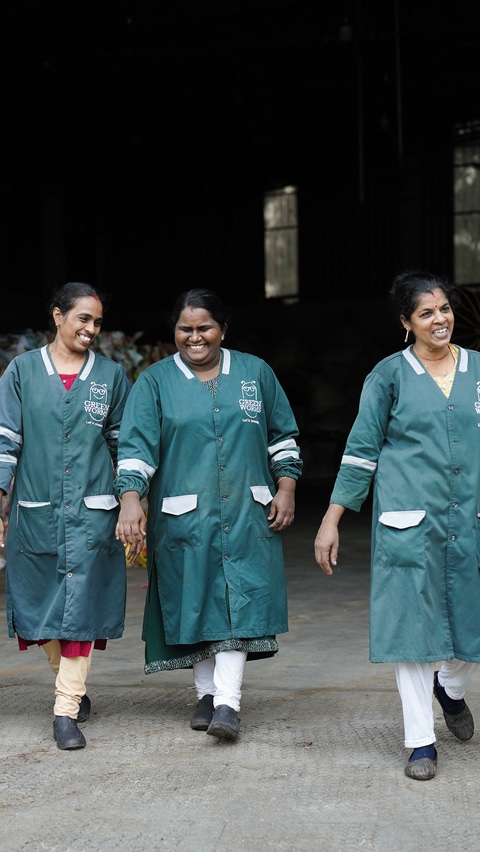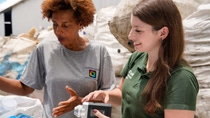Media
Turning waste into opportunity
When Jabir Karat first confronted the magnitude of India’s waste crisis, he felt compelled to take action. By working as a ragpicker after graduation, he gained invaluable firsthand experience of the challenges faced by informal waste workers. This insight inspired him to establish Green Worms Eco Solutions, a social enterprise recognized by UNESCO Green Citizens for tackling the waste crisis, empowering women, and engaging communities in sustainable change. In BASF, Jabir found an experienced partner to support the recycling of material from the shoe production.
Mr. Karat, how did people in your area dispose of their trash before you started your business in 2014?
In most rural areas, people simply burned their waste in their backyards, buried it or dumped it into local water bodies. This was common practice because there was no formal waste collection system in India, especially in rural and semi-urban regions. Only a few large cities – perhaps 10 % to 20 % of locations – had any kind of waste collection.

When did you first become aware of the problem?
After university, I applied for the Gandhi fellowship and spent two years working to improve education programs in the slums of Mumbai, India’s largest city. There, I saw firsthand how the city managed its garbage. I realized that instead of just criticizing governments or other organizations, I could be part of the solution. That’s when I decided to take action.
To develop your business idea, you worked as a ragpicker for eight months. What did your typical day look like?
Every day began at 6 a.m. with a battery-operated tricycle. Alongside two women, I would ride through the community, collecting waste door to door from about 200 households. This was part of a program to formalize informal waste workers. I acted as both driver and accountant, helping organize the collection process. Our day ended around 5 p.m., with a break between 12 and 2 p.m. for rest and reorganization.
What obstacles did you face when you founded Green Worms in Kerala, India?
It took me 4 or 5 years to stabilize the business. There were countless times I considered giving up. While the technical aspects worked, financial sustainability was a struggle. My co-founders and first investors left. There were many challenges in those early days, but each obstacle was a learning experience. Persistence and, above all, passion kept me going. I was constantly thinking about waste and how to solve these problems.
Collaborate to close the loop
BASF supports Green Worms with its recycling experience. From 2026, the company will provide Green Worms with polyurethane waste from its customers that is generated during shoe manufacturing. Green Worms will then recycle the material and produce items such as furniture or playground flooring, which will be donated to schools. The project will create new jobs, promote an understanding of the circular economy among the community, and benefit local schools.
You can find more information about BASF’s footwear solutions here: Footwear
How did you generate revenue?
At the beginning, we charged households and businesses a small fee for garbage collection, which was less expensive than incineration. We also sold the recyclable fraction of the waste to recyclers across India. Today, our revenue streams have grown from two to seven. For example, we now sell some waste as an alternative fuel to cement factories, replacing coal. We even opened a thrift store to sell textiles we collect.
Who is in your team?
When we started, women in many communities had few opportunities to earn their own income. At Green Worms, we recognized their resilience and built our model around them – ensuring fair wages, safe workplaces, and dignified livelihoods. Today, we have created more than 850 jobs.


What types of waste do you collect?
We collect plastics, paper, metals, electronics, textiles – essentially, all materials that are valuable resources. These are natural resources that have already been extracted, and our goal is to return them to the economy through recycling. For example, we collect shoes from households and bring them to our footwear recovery facility, where they are sorted into different material types. We then shred the materials into fine powders, which are compressed in molding machines. We use both post-consumer and post-industrial footwear waste, as even manufacturing new shoes results in some waste. It’s a great opportunity that we can collaborate with the BASF team, who is very experienced in that field.
What changes has Green Worms achieved?
We have closed all dump sites in the areas where we operate, ensuring that no waste goes to landfill. Instead, 100 % of waste is recovered for reuse, repurposing, recycling, or conversion to fuel. This has resulted in cleaner streets and communities, and the change is visibly appreciated. Initially, convincing village leaders and officials was challenging, but now many people approach us to witness the transformation. The most visible impact is the closure of open dump sites, something we are truly proud of.



